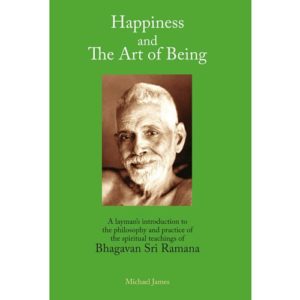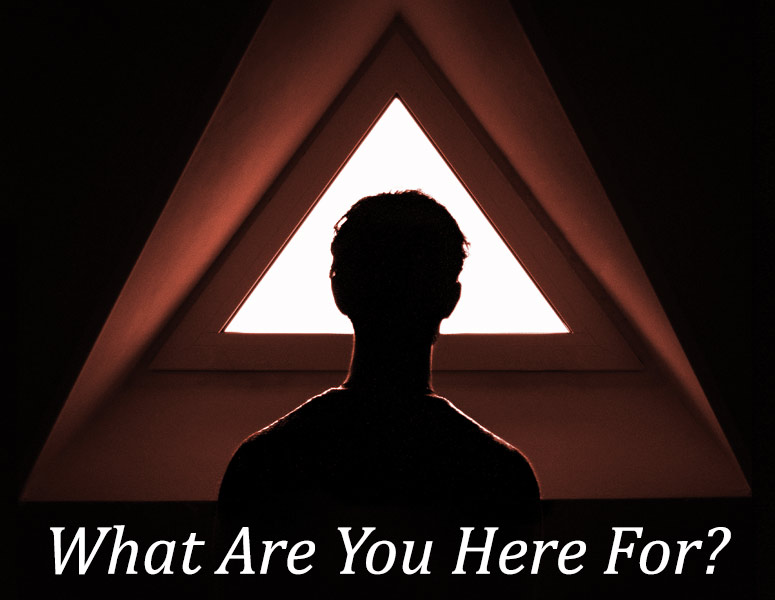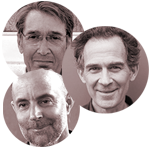Happiness and the Art of Being: A Layman’s Introduction to the Philosophy and Practice of the Spiritual Teachings of Bhagavan Sri Ramana
By Michael JamesBuy From Amazon
Happiness is our true nature, our essential being. The transient happiness that we seem to derive from external experiences actually arises only from within ourself, and is experienced by us due to the temporary calming of our mind that occurs whenever any of our desires are fulfilled. So long as our mind is extroverted, attending to anything other than our own essential self-conscious being, we can never experience perfect, permanent and unqualified happiness. To experience true and eternal happiness, we must attain the experience of true self-knowledge – that is, absolutely clear consciousness of our own essential being, ‘I am’. Such is the truth revealed by Bhagavan Sri Ramana.
The philosophy of Sri Ramana derives solely from his experience of true, absolute, non-dual self-knowledge, an experience that transcends all thought, both rational and irrational. However, since we imagine the existence of duality, multiplicity and relativity, we seem to lack the non-dual and absolute knowledge of our own essential self-conscious being that Sri Ramana experienced as his natural state. Therefore he presented his philosophy to us in terms of a rational and logical analysis of our present experience of ourself as a finite individual consciousness, in order to enable us to be firmly convinced of the absolute reality that underlies and supports this finite consciousness that we now mistake to be ourself.
However, the spiritual teachings of Sri Ramana are not only a rational philosophy, but are also a precise science and art. He intended his philosophy to serve only as the theoretical foundation upon which we should practise the empirical science of self-investigation (ātma-vicāra), which is the art of keenly self-attentive and therefore perfectly thought-free being.
This book, Happiness and the Art of Being, is an in-depth exploration of both the philosophy and the practice of the spiritual teachings of Bhagavan Sri Ramana. Though it is intended primarily to be an introduction to his teachings, it is not a brief one, because in a clear and simple manner it provides a very detailed and deep insight into their core. Therefore though it has been written with the intention that it should be easily understood even by readers who have no previous acquaintance with any form of spiritual philosophy, it should also be useful to readers who already have a good understanding of his teachings.
Like the aim of his teachings, the aim of this book is to prompt each one of us to think more deeply about the reality of all that we as a seemingly limited individual consciousness experience and know, to help us to understand that the only absolute reality in our entire experience of duality and relativity is our fundamental consciousness of our own essential being, ‘I am’, and thereby to reinforce our love and effort to attend keenly and exclusively to this essential self-consciousness ‘I am’ in order to discover its true nature.
The author of this book, Michael James, spent more than eight years studying the original Tamil writings of Sri Ramana and of his foremost disciple, Sri Muruganar, in minute detail under the clear guidance of another close disciple, Sri Sadhu Om. Therefore the central focus of this book is on the teachings of Sri Ramana as expressed in his own original writings, and hence it contains accurate and carefully worded translations by the author of the whole of Sri Ramana’s prose treatise Nāṉ Yār? (Who am I?) and of most of the verses of his philosophical poems such as Upadēśa Undiyār, Uḷḷadu Nāṟpadu, Ēkātma Pañcakam, Āṉma-Viddai and Upadēśa Taṉippākkaḷ.
This kindle edition is a slightly revised version of the printed edition, and contains a detailed glossary.
For more information about Sri Ramana and his teachings, please visit the author’s website: happinessofbeing.com.
This Book is related to
Nonduality (Advaita)Michael James, Ramana Maharshi


